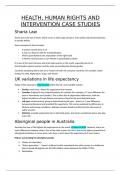HEALTH, HUMAN RIGHTS AND
INTERVENTION CASE STUDIES
Sharia Law
Sharia law is the law of Islam, which covers a wide range of topics, from public and private behaviour
to private beliefs.
Some examples of these include:
- A woman cannot drive a car
- A man can beat his wife for insubordination
- Theft is punishable by the amputation of the right hand
- A Muslim who becomes a non-Muslim is punishable by death
It is one of the most intrusive and strict legal systems in the world, especially due to its
discrimination against women and the rules surrounding the female gender.
Countries employing Sharia law are a mixture of both rich and poor countries, for example: Saudi
Arabia, the UAE, Afghanistan, Sudan and Yemen.
UK variations in life expectancy
Range of life expectancy determinants within the UK, most notable include:
Gender: men have a lower life expectancy than women
Counties: England is very inequal between its counties (for example a 15 year difference for
men in Manchester and London). This is often due to deprivation differences, with the
highest incidences of heart disease and cancers found in the most deprived areas.
Job type: socioeconomic group is determined by job type – there is a 7 year difference
between professional and unskilled life expectancy. This can be explained by differences in
lifestyle and housing conditions, attitudes towards health and diet and also the levels of
safety at work.
Ethnicity: possible explanation lies in inherited genes, but factors mentioned above also play
a key role.
Aboriginal people in Australia
Australia has one of the highest life expectancies in the world: 83 years in 2020. However, there are
many differences between states. One of the main reasons for this is due to the higher proportion of
Aboriginal Australians in some areas, who have a much lower life expectancy (8-9 years lower)
History surrounding the Aboriginal people:
History of colonialism
‘Stolen generation’ – ‘brown’ children forcibly assimilated into white society in a deliberate
plan to breed Aboriginals out (50,000 children stolen between the 1860s-1970s)
Sterilisation
, Why is Aboriginal life expectancy so much lower?
According to the UN, quality of life for Aboriginal people is the second worst in the world
Poor housing
Dispossession of their traditional lands
Low education level
High unemployment
Hidden ethnic discrimination
Use of illicit substances, alcohol abuse
Heavy smoking
Lack of access to healthcare (many Aboriginal people do not have the transport to get them
to medical centres)
Dominant IGOs – shifting attitudes
3 major IGOs of global development = WTO, World Bank, IMF
Traditionally: efforts focused on economic development, seeing it as a springboard for advances on
broader front of human development. Promoted neo liberal views on development based on
adoption of free trade, privatisation and deregulation of financial markets.
Shifting attitudes: whilst still focused on economic success and the global economy, recent
programmes have been aimed at improving environmental quality, health, education and human
rights.
Not all IGOs are focused on economic development: e.g., the OECD (Organisation for Economic Co-
operation and Development) or UNESCO (United Nations Educational, Scientific and Cultural
Organisation).
- Agendas are more focused on human condition, quality of life (health and education) and
human rights.
- OECD promotes policies that will improve the economic and social wellbeing of people
around the world, working with governments to understand what drives economic, social
and environmental change. It’s policies are designed to improve the quality of people’s lives.
- UNESCO’s purpose is to contribute to peace and security by promoting international
collaboration to further universal respect for justice, human rights and freedom.
UN MDGs and SDGs
What were the UN’s Millennium Development Goals?
A set of targets agreed in 2000 in a series of international conferences and summit meetings
of the world’s leaders.
Aim was to fight poverty and combat a range of issues hampering human development –
mainly focused on helping developing countries to improve the quality of life for those living
there.
8 key areas: extreme poverty, education, gender equality, child mortality, maternal health,
HIV/AIDS and other diseases, environmental sustainability, global partnership for
development.
How were the MDGs successful?





